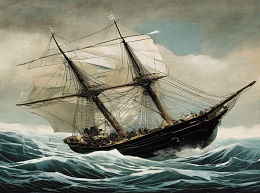The Road

"The Road" is a post-apocalyptic novel written by American author Cormac McCarthy, published in 2006. It is a stark and harrowing tale of survival in a desolate world. Here's a summary:
Setting:
The novel is set in a post-apocalyptic world, although the cause of the apocalypse is not explicitly stated. The landscape is barren, and the environment is ash-covered, indicating a catastrophic event.
Characters:
-
The Man: The father, who is trying to protect and guide his son through the post-apocalyptic landscape.
-
The Boy: The son, a child born after the apocalypse, who accompanies his father on their journey.
Plot Summary:
-
Journey South:
- The novel follows the journey of a father and his young son as they travel south through a desolate and ash-covered landscape. They are pushing a shopping cart containing their few belongings.
-
Struggle for Survival:
- The father and son face numerous challenges as they navigate the harsh and dangerous world. Food is scarce, and they must avoid bands of cannibals and other dangers.
-
Flashbacks:
- The novel incorporates flashbacks that provide glimpses of the world before the apocalypse, including the mother's suicide and the father's struggle with the moral implications of their survival.
-
Themes of Survival and Morality:
- The novel explores the themes of survival and morality in a world where the usual ethical boundaries have eroded. The father struggles to protect his son and maintain a sense of humanity in a seemingly hopeless world.
-
Encounters with Others:
- The father and son encounter other survivors, some of whom are desperate and dangerous. The novel raises questions about trust, compassion, and the lengths to which individuals will go to survive.
-
Declining Health of the Father:
- The father's health deteriorates over the course of the journey. He is determined to ensure his son's survival, even as he faces his own mortality.
-
The Boy's Future:
- The novel poses questions about the future of the boy in a world that seems irreversibly damaged. The father imparts his knowledge and values to the boy, emphasizing the importance of carrying the "fire" of goodness and humanity.
-
Conclusion:
- The novel reaches its conclusion with a sense of uncertainty about the boy's fate. The narrative suggests that the journey is one of survival, but the ultimate outcome remains open to interpretation.
Themes:
-
Survival and Desperation: The novel explores the extreme lengths to which individuals may go to survive in a post-apocalyptic world.
-
Father-Son Relationship: The relationship between the father and son is at the heart of the story, emphasizing the themes of love, protection, and the passing down of values.
-
Loss and Desolation: The novel conveys a sense of loss and desolation, both in terms of the physical environment and the breakdown of societal norms.
-
Morality in Desperate Times: The novel raises questions about morality in a world where survival is precarious, and traditional moral codes have collapsed.
Significance:
-
Critical Acclaim: "The Road" received widespread critical acclaim for its stark prose, emotional depth, and exploration of existential themes.
-
Pulitzer Prize: The novel won the Pulitzer Prize for Fiction in 2007, cementing its status as a significant work of literature.
-
Adaptation: "The Road" was adapted into a film in 2009, starring Viggo Mortensen as the father.
-
Cultural Impact: The novel has had a lasting impact on readers and has been influential in the post-apocalyptic fiction genre.
"The Road" is a powerful and haunting exploration of the human condition in the face of extreme adversity. Its stark prose and existential themes have resonated with readers, and the novel continues to be studied and discussed for its literary merit and philosophical depth.













